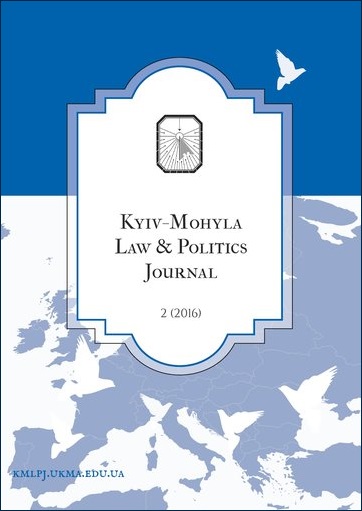Illegal Crossing of the State Border in Light of Polish Criminal Law
DOI:
https://doi.org/10.18523/kmlpj88207.2016-2.189-201Keywords:
Schengen Borders Code, internal borders, external borders, unlawful crossing of the state border, penalization of illegal crossing the Polish border, statute of limitations, rehabilitation of offenderAbstract
The subject of this paper is the illegal crossing of the Polish border. The paper focuses on criminal law issues. To explain the element “in violation of the relevant regulations,” being one of the elements of the criminal offences regarding the illegal crossing of the state border, the author begins by presenting the significant regulations of the Schengen Borders Code and of the Polish statute on the protection of the state border. The author then makes a detailed analysis of offences concerning the unlawful crossing of the Polish border. The statute of limitations on punishability and provisions for the rehabilitation of offenders convicted of the illegal crossing of the Polish border are also the subject of the analysis. The author concludes by making the evaluation of Polish criminal law regulations on the illegal crossing of the state border.References
- Legal Acts
- Agreement between the Republic of Poland and Ukraine “On Legal Regime on the Polish-Ukrainian State Border and Cooperation and Mutual Assistance in Border Issues.” Kyiv, January 12, 1993, Dziennik Ustaw 63 (1994), item 267.
- Announcement of the Interior Minister of 3 July 2015 “On the Border Crossing points, Type of Movement Allowed at these Crossing Points and Opening Hours of these Crossing Points.” Monitor Polski, July 21, 2015, item 636. Accessed March 18, 2016, http://isip.sejm.gov.pl/DetailsServlet?id=WMP20150000636.
- “Council Regulation (EC) No 539/2001 of 15 March 2001 Listing the Third Countries whose Nationals Must be in Possession of Visas when Crossing the External Borders and those whose Nationals are Exempt from that Requirement.” Accessed March 16, 2016. http://eur-lex.europa.eu/legal-content/EN/ALL/?uri=celex%3A32001R0539.
- “Regulation No 562/2006 of the European Parliament and of the Council of 15 March 2006 Establishing a Community Code on the Rules Governing the Movement of Persons across Borders (Schengen Borders Code).” Accessed March 15, 2016. http://eur-lex.europa.eu/legal-content/EN/TXT/?uri=URISERV%3Al14514.
- Statute of 12 October 1990 “On the Border Guard.” Dziennik Ustaw, November 19, 1990, No. 78, item 462, with later changes.
- Statute of 12 October 1990 “On the Protection of State Border.” Dziennik Ustaw, November 19, 1990, No. 78, pos. 461 with later changes.
- Statute of 2 April 1997 “The Constitution of the Republic of Poland.” Dziennik Ustaw, July 16, 1997, No. 78, item 483, with later changes.
- Statute of 20 May 1971 “The Code of Contraventions.” Dziennik Ustaw, May 31, 1971, No. 12, item 114, with later changes.
- Statute of 6 June 1997 “The Penal Code.” Dziennik Ustaw, August 2, 1997, No. 88, item 553, with later changes.
- Literature
- Bojarski, Marek. “Komentarz do art. 49a k.w.” In Kodeks wykroczeń. Komentarz, edited by M. Bojarski and W. Radecki, 394–98. Warszawa: C.H. Beck, 2013.
- Bojarski, Tadeusz. “Komentarz do art. 49a k.w.” In Kodeks wykroczeń. Komentarz, edited by T. Bojarski, 119–20. Warszawa: Lexis Nexis, 2009.
- Ćwiąkalski, Zbigniew. “Komentarz do art. 264 k.k.” In Kodeks karny. Część szczególna. Tom II. Komentarz do art. 117–277, edited by A. Zoll, 1446–53. Warszawa: LEX a Wolters Kluwer business, 2013.
- Góral, Roman. Kodeks karny. Praktyczny komentarz. Warszawa: Wydawnictwo Zrzeszenia Prawników Polskich, 2007.
- Gruszecka, Dagmara. “Komentarz do art. 264 k.k.” In Kodeks karny. Część szczególna. Komentarz, edited by J. Giezek, 960-5. Warszawa: LEX a Wolters Kluwer business, 2014.
- Herzog, Aleksander. “Komentarz do art. 264 k.k.” In Kodeks karny. Komentarz, edited by R.A. Stefański, 1656–59. Warszawa: C.H. Beck, 2015.
- Jachimowicz, Marcin. “Nowe zasady odpowiedzialności za nielegalne przekroczenie granicy RP.” Prokuratura i Prawo 5 (2006): 49–64.
- Kalitowski, Michał. “Komentarz do art. 264 k.k.” In Kodeks karny. Komentarz, edited by M. Filar, 1383–85. Warszawa: Wolters Kluwer, 2014.
- Kotowski, Wojciech. Kodeks wykroczeń. Komentarz. Warszawa: Oficyna a Wolters Kluwer business, 2009.
- Marek, Andrzej. Kodeks karny. Komentarz. Warszawa: LEX a Wolters Kluwer business, 2010.
- Marek, Andrzej. Prawo karne. Warszawa: C.H. Beck, 2011.
- Michalska-Warias, Aneta. “Komentarz do art. 264 k.k.” In Kodeks karny. Część szczególna. Tom II. Komentarz. Art. 222–316, edited by M. Królikowski and R. Zabłocki, 392–402. Warszawa: C.H. Beck, 2013.
- Mirgos, Zbigniew. “Przestępstwo bezprawnego przekroczenia granicy państwowej PRL na tle porównawczym.” Nowe Prawo 9 (1987): 43–57.
- Mozgawa, Marek. “Komentarz do art. 264 k.k.” In Kodeks karny. Komentarz, edited by M. Mozgawa, 655–58. Warszawa: LEX a Wolters Kluwer business, 2014.
- Mozgawa, Marek. “Komentarz do art. 49a k.w.” In Kodeks wykroczeń. Komentarz, edited by M. Mozgawa, 175–77. Warszawa: LEX a Wolters Kluwer business, 2009.
- Piórkowska-Flieger, Joanna. “Komentarz do art. 264 k.k.” In Kodeks karny. Komentarz, edited by T. Bojarski, 626–28. Warszawa: Lexis Nexis, 2011.
- Wiak, Krzysztof. “Komentarz do art. 264 k.k.” In Kodeks karny. Komentarz, edited by A. Grześkowiak and K. Wiak, 1223–25. Warszawa: C.H. Beck, 2015.
- Electronic Sources
- “Granice RP.” The Border Guard website. April 23, 2008. Accessed March 19, 2016. https://www.strazgraniczna.pl/pl/granica/granice-rp/1910,Granice-RP.html.
- “Polska w strefie Schengen.” The Embassy of the Republic of Poland in Cairo website. Accessed December 17, 2016. http://www.kair.msz.gov.pl/pl/informacje_konsularne/polska_w_schengen/.
Downloads
Published
How to Cite
Issue
Section
License
Copyright (c) 2016 Katarzyna Banasik

This work is licensed under a Creative Commons Attribution 4.0 International License.
Kyiv-Mohyla Law and Politics Journal provides free access to original research without restriction barriers (i.e. subscription fees, licensing fees etc.).
Unless otherwise indicated, content is licensed under the Creative Commons Attribution 4.0 International (CC BY 4.0) license, which means you are free to:
distribute, remix, tweak, and build upon your work, even commercially
...provided that any use is made with attribution to author(s) and Kyiv-Mohyla Law and Politics Journal.
The copyright in the article or any other submission to Kyiv-Mohyla Law and Politics Journal shall remain with the author(s).
The journal allows the author(s) to hold the copyright without restrictions and will retain publishing rights without restrictions.





